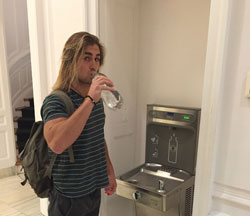The world needs to start heading down a more sustainable path for the sake of future generations. We are over-populating, overeating, overfishing, and overusing. Multibillion-dollar corporations corner the industry and put money in the pockets of those that have influence politically and have the power to make a change.
It’s up to big name brands like Adidas, who are releasing a shoe made up of 95 percent ocean plastic, to make a difference and be the change. In 2017, the brand aims to produce one million pairs of the sneakers made from more than 11 million plastic bottles.
Another big name busines, IKEA, has just unveiled a furniture set made out of recycled plastic and reclaimed wood.
“We need to become better at using the planet’s resources in a smart way. Our ambition is to increase the share of recycled materials in our products,” said Anna Granath, product developer at IKEA. “We are looking into new ways to re-use materials, such as paper, fibre, foam and plastic, so that we can give them a new life in a new product.”
Later in 2017, IKEA has plans to release an even more sustainable and “waste-free” line of furniture, and continue to produce more sustainably.
When Keurig came out with the single-serve coffee machine that almost instantly brews a cup of joe, it seemed like the best innovation at the time. Little did we realize how detrimental they could be to the environment and our health.
According to theatlantic.com, ” In 2014, enough K-Cups were sold that if placed end-to-end, they would circle the globe 10.5 times.”
In an interview with the The Atlantic, John Sylvan, the founder of Keurig, said, “I feel bad sometimes that I ever [created them].” If you have ever seen the hashtag #killthekcup, it started from an anonymous video depicting a Hollywood-grade visual effects movie of an invasion of the K-cup.
At least we have companies like popular coffee brand Chock Full o’ Nuts with their new “Brew and Renew” campaign promoting the world’s first certified 100 percent compostable single-serve pod, or retail giant Target pledging to remove harmful chemicals from their products and invest in a cleaner, safer, alternative called green chemistry.
A senior business administration and marketing student John Musial said, “Sustainability is important for companies to understand that to keep shareholders happy, you will need to have a plan for the future, so more companies should definitely be looking into sustainability.”
Musial explained, “New Belgium Brewery in Fort Collins, Colorado is one of the companies I know that believes in sustainability. They focus on the social, environmental, and financial aspects to ensure the best product and the least harm to the environment. They design their factories to produce their products with a very small carbon footprint, the cleanest and purest water, and almost 100% of their waste is eliminated.”
Chosen by The Princeton Review as a 2013 Green College, Monmouth University participates in a green campus initiative taking steps to decrease their carbon emissions, energy use, and make as many conservation efforts as possible. Monmouth was the very first private institution of higher education in the garden state to work with the Environmental protection Agency, or EPA.
The newer buildings on campus contain lights that turn off when not in use, conservative water fountains that help save water waste and energy, solar panels to harness the energy from the sun to use for power, and recycling efforts all around campus.
William Hobbie, a junior wildlife biology student at Clemson University, said, “Clemson University tries really hard to be sustainable since we’re a land grant university that started as an agricultural school. The big one is that they want to be carbon emission free by 2030. Monmouth University seems to also be very ‘green’ oriented and absolutely heading down the right path.”
Hobbie added, “I think it’s very important for schools to implement sustainable practices because they’re educating the future of our country. If our politicians won’t go green then it’s only right to educate the new generation on how to be sustainable so that the earth can be saved hopefully in the near future.”
Dr. Chris Hirschler Ph.D, Chair of the Health and Physical Education Department, said, “Institutions of higher education should be leading the way. If we’re not teaching it, practicing it, and modeling at the university, what hope is there that it will happen on a scale that is needed to avert some of the most dire predictions of global catastrophe?”
According to an article posted on onegreenplanet.org, “For 61 percent of college applicants who indicate that a college’s commitment to the environment is an important factor in their decision, just pondering this question might provoke a state of cognitive dissonance.”
Companies realize what’s going on in the world; it’s just a matter of what’s more important, the money or our planet. If you keep your eyes open, you’ll realize the change that is coming, slowly but surely.
“Higher education is big business. Colleges use a lot of paper, produce large quantities of e-waste, and have large heating and cooling budgets. There are nearly 5,000 institutions of higher education and they train the next generation of academic and business leaders. What we do here matters.”
As mentioned by a post within the University’s website on Oct. 28, 2016, “Monmouth University has once again been singled out as one of the country’s most environmentally responsible universities. The Princeton Review’s Guide to 361 Green Colleges: 2016 edition listed the University for its exceptional commitments to sustainability, based on academics and career preparation, ‘green’ policies, initiatives and activities.”
The post also reads, “This is the third year that the Princeton Review has included Monmouth in the guide, which is not published on paper, but is instead made available in a more sustainable free download at www.princetonreview.com/green-guide.”
Large corporations are coming to realize the impact we are having on the planet and the role they play themselves. But, the ones that realize they have an even bigger role in laying the foundation for our future in sustainability and conservation are the ones that will keep us afloat and continue making a difference.
IMAGE TAKEN by Zachary Karvelas




